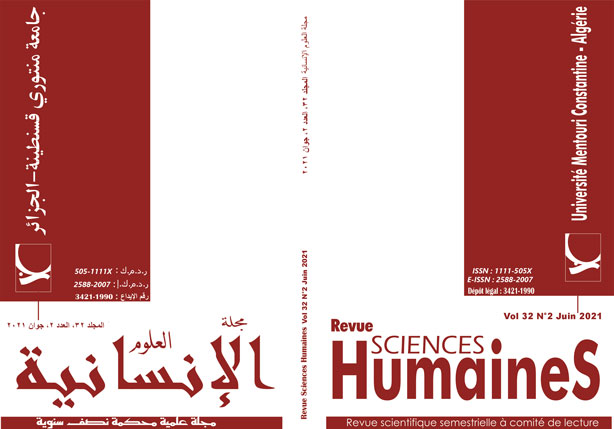On the Correlation between Algerian EFL Learners’ Critical Thinking Skill and Reading Ability
Mots-clés :
pensée critique, capacité de lecture, corrélation, entretiens semi-directifs, interviews à message instantanéRésumé
Cette contribution vise à étudier la relation pouvant exister entre la pensée critique et la capacité de lecture chez les étudiants en première année master du département d’anglais de l’Université 8 Mai 1945 sise Guelma. Dans ce contexte, la collecte des données est réalisée auprès de vingt-deux étudiants et sept enseignants dont ceux pratiquant simultanément à l’Université Badji Mokhtar d’Annaba. Nous utilisons comme outils de recherche : un test de pensée critique, le test de lecture IELTS (système international de test de la langue anglaise), des entretiens semi-directifs et des interviews à messages instantanés. Afin de pouvoir déterminer la nature de la relation existant entre le niveau de pensée critique des apprenants et la capacité de lecture, il a été effectué le calcul du coefficient de corrélation (r). Il en résulte suite à cette investigation, qu'il existe une corrélation positive et significative entre les différentes variables.
Téléchargements
Références
Aebersold, J., A. Field M.L. (1997). From reader to reading teacher: issues and strategies for
second language classrooms. New York. Cambridge University Press.
Anderson, L. W. Krathwohl, D. R., & Airasian, P. W. (2001). A taxonomy for learning,
teaching,and assessing: A revision of Bloom's taxonomy of educational objectives. New York:
Longman.
Bailin, S., Case, R., Coombs, J. R., & Daniels, L. B. (1999). Conceptualizing critical
thinking. Journal of Curriculum Studies, 31(3), 285–302.
Beyer, B.K. (1985). Critical thinking: What is it?, Social Education, vol.40, pp.270- 276.
Beyer, B.K. (1987). Practical strategies for the teaching of thinking, Allyn and Bacon, Inc.,
Boston.
Bloom, B. (1956). Taxonomy of educational objectives. New York: David McKay Co. Inc.
Cameron, L. 2001. Teaching Languages to Young Learners. Cambridge: Cambridge
University Press.
Davies, Florence (1995). Introducing Reading. London: Penguin Books Limited. Dewey, J.
(1938). Experience and education. NY: Collier.
Dressel, P.L. & Mayhew, L.B. (1954). General education: Explorations in evaluation, the
final report of the cooperative study of evaluation in general education of the American
Council on Education, American Council on Education, Washington, D.C.
Ennis, R.H. (1962). A concept of critical thinking: A proposed basis for research in the
teaching and evaluation of critical thinking ability, Harvard Educational Review,vol.32,
pp.81-11
Ennis, R. H. (1985). A logical basis for measuring critical thinking skills. Educational
Leadership, 43(2), 44–48.
Facione, N.C. Facione, P.A. (1997). Critical thinking assessment in nursing education
programs: An aggregate data analysis, The California Academsc Press, Millbrae, CA.
Facione, N.C., Facione, P.A. and Sanchez, C.A. (1994) Critical thinking disposition as a
measure of competent clinical judgment: The development of the California critical thinking
disposition inventory. The Journal of Nursing Education, 33, 345-350.
Facione, P. A. (1990). Critical thinking: A statement of expert consensus for purposes of
educational assessment and instruction. Millbrae, CA: The California Academic Press.
Facione, P. A. (2018). Critical Thinking: What is it and What it Counts. Measured Reasons
LLC and Insight Assessment. Retrieved from
https://www.insightassessment.com/wpcontent/uploads/ia/pdf/whatwhy2018.pdf (13/08/2019)
Facione, P.A., Facione, N.C. (1994). The Holistic Critical Thinking
Scoring Rubrics HCTSR Retrived from
https://insightassessment.com/wpcontent/uploads/ia/pdf/Rub_HCTSREnglish.pdf
(15/08/2019)
Fisher, A. (2001).Critical thinking: An Introduction. Cambridge, UK: Cambridge University
Press.
Grellet, Francoise. 1998. Developing Reading Skill. Cambridge: Cambridge University.
Hager, P., Sleet, R., Logan, P., & Hooper, M. (2003). Teaching critical thinking in
dergraduate science courses. Science & Education, 12(3), 303-313.
Halonen, J. S. (1995). Demystifying critical thinking. Teaching of Psychology, 22(1), 75–81.
Halpern, D. F. (1998). Teaching critical thinking for transfer across domains: Dispositions,
skills, structure training, and metacognitive monitoring. American Psychologist, 53(4), 449
IELTS Practice Tests: Cambridge IELTS 13 Academic Student's Book with Answers:
Authentic Examination Papers. Cambridge University Press. (used with permission of the
licensor through PLSclear.)
Inglis, F. and Aers, L. (2008) Key Concepts in Education, London, Sage.
Kinney, JA. (1980). Why bother? The importance of critical thinking, in Young, R.E.
Fostering critical thinking: New directions for teaching and learning, no.3, Jossey-Bass, San
Francisco, pp.1-10.
Kuhn, D. (1999). A developmental model of critical thinking. Educational Researcher,
(2), 16–26
Kurfiss, J. G. (1988). Critical thinking: Theory, research, practice, and possibilities, ASHE
ERIC Higher Education Report no.2, Association for the Study of Higher Education,
Washington D.C.
Lipman, M. (1988). Critical thinking—What can it be? Educational Leadership, 46(1), 38
McPeck., J.E. (1981). Critical thinking and education, Martin Robertson, Oxford.
Pascarella, E. T., & Terenzini, P. T. (2005). How college affects students: A third decade of
research. San Francisco, CA: Jossey-Bass.
Paul, R.W. (1985). Critical thinking research: A response to Stephen Norris, Educational
Leadership, vol.42, pp.46.
Stangor, C. (2014). Research methods for the behavioral sciences (5th ed). New York:
Cengage Learning.
Young, R. E. (1980). Fostering critical thinking: New directions for teaching and learning,
no.3, Jossey-Bass, San Francisco.
Téléchargements
Publié-e
Comment citer
Numéro
Rubrique
Licence

Cette œuvre est sous licence Creative Commons Attribution - Pas d'Utilisation Commerciale - Partage dans les Mêmes Conditions 4.0 International.

















